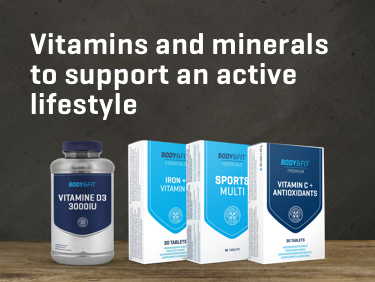Have you ever thought “I work out regularly, does that mean I need extra vitamins or minerals?” It’s a question we often hear, and it’s honestly not a strange thing to ask. Some research actually does suggest that an active lifestyle might increase your vitamin needs. While there are no official guidelines yet, we’ll highlight some vitamins and minerals you could consider supplementing.
B Vitamins
For athletes, B vitamins are of particular interest to keep an eye on. That’s because this group of vitamins plays a role in a lot of processes that influence your performance. For example, Thiamine (B1) helps to convert the carbohydrates you consume into energy. And have you noticed that vitamin B12 is included in a lot of energy drinks? That’s because it helps reduce fatigue. You’ll find B vitamins in a lot of different foodstuffs, ranging from grains to meats and vegetables. For example, beef liver is very high in vitamin B12, while leafy greens like spinach stand out for their high folate (B9) content. You could also consider a multivitamin or vitamin b-complex supplement.
Vitamin C
Did you know working out increases physical stress levels that affect your immune system? That’s where vitamin C comes in! Vitamin C helps maintain the normal function of the immune system during and after intense physical exercise. That’s why it’s extra important to keep an eye on your vitamin C intake when you work out regularly. You’ll find vitamin C in fruits and vegetables like citrus fruits, kiwis, berries, bell pepper and Brussels sprouts. Looking for an easier option? We offer a wide range of Vitamin C supplements.
Vitamin D
Our body can produce its own vitamin D but it needs the sun to do so. This can get a bit tricky when the dark winter months comes along, increasing the risk of a vitamin D deficiency. Vitamin D contributes to the maintenance of normal muscle function, immune system and normal bones.
Do you think you might be running low on this sunny vitamin? Try Vitamin D3 – 3000 IU. Just one capsule a day will do. Children, older people, people with darker skin and pregnant women could benefit from a little extra vitamin D too.
Magnesium
Your body can’t produce magnesium by itself, so you need to consume it through magnesium-rich foods or with a supplement. Magnesium plays multiple important roles in the human body. It contributes to a normal energy-yielding metabolism, to muscle function, to a reduction of fatigue and much more! Research suggests that the increase in sweat loss from working out may increase magnesium requirements1. So if you’re very active, make sure you’re eating enough magnesium-rich foods, like nuts, beans, grains and dark leafy vegetables like spinach. Or you could always opt for a supplement.
Iron
Iron deficiencies are quite common among athletes, whether exercise is the cause or a specific diet2. Iron plays an essential role in the formation of red blood cells and contributes to oxygen transport, a reduction of tiredness and fatigue and much more. Women seem to have a higher risk than men2, as well as young children and vegetarians. You can find iron in foods like red meat, whole-wheat foods and dark green vegetables.
If you want to know more about vitamins and mineral, just get in touch with our qualified nutrition experts. They’d love to answer your questions and can give you some personal recommendations.
References
- Nielsen, F.H., & Lukaski, H. (2006). Update on the relationship between magnesium and exercise. Magnesium research, 19(3), 180-9.
- Nickerson, H. J., Holubets, M. C., Weiler, B. R., Haas, R. G., Schwartz, S., & Ellefson, M. E. (1989). Causes of iron deficiency in adolescent athletes. The Journal of Pediatrics, 114(4), 657–663.


